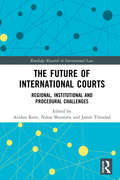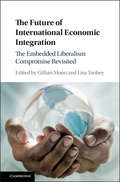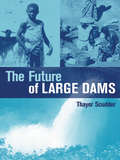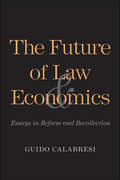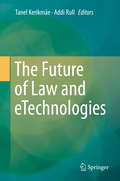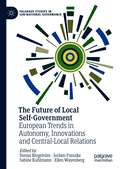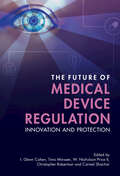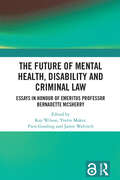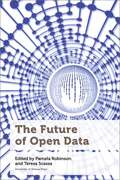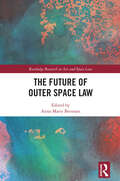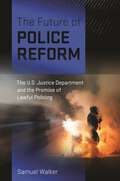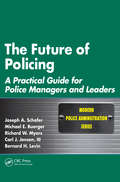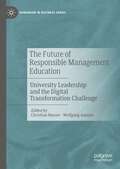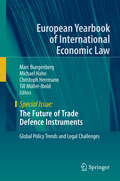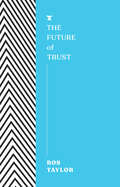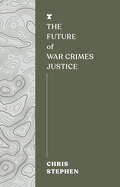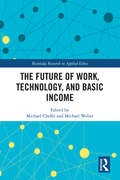- Table View
- List View
The Future of Immortality: Remaking Life and Death in Contemporary Russia (Princeton Studies in Culture and Technology #23)
by Anya BernsteinA gripping account of the Russian visionaries who are pursuing human immortalityAs long as we have known death, we have dreamed of life without end. In The Future of Immortality, Anya Bernstein explores the contemporary Russian communities of visionaries and utopians who are pressing at the very limits of the human.The Future of Immortality profiles a diverse cast of characters, from the owners of a small cryonics outfit to scientists inaugurating the field of biogerontology, from grassroots neurotech enthusiasts to believers in the Cosmist ideas of the Russian Orthodox thinker Nikolai Fedorov. Bernstein puts their debates and polemics in the context of a long history of immortalist thought in Russia, with global implications that reach to Silicon Valley and beyond. If aging is a curable disease, do we have a moral obligation to end the suffering it causes? Could immortality be the foundation of a truly liberated utopian society extending beyond the confines of the earth—something that Russians, historically, have pondered more than most? If life without end requires radical genetic modification or separating consciousness from our biological selves, how does that affect what it means to be human?As vividly written as any novel, The Future of Immortality is a fascinating account of techno-scientific and religious futurism—and the ways in which it hopes to transform our very being.
The Future of Indian and Federal Reserved Water Rights: The Winters Centennial
by Barbara Cosens Judith V. RoysterOn January 6, 1908, the Supreme Court ruled that when land is set aside for the use of Indian tribes, that reservation of land includes reserved water rights. The Winters Doctrine, as it has come to be known, is now a fundamental principle of both federal Indian law and water law and has expanded beyond Indian reservations to include all federal reservations of land. Ordinarily, there would not be much to say about a one hundred-year-old Supreme Court case. But while its central conclusion that a claim to water was reserved when the land was reserved for Indians represents a commitment to justice, the exact nature of that commitment-its legal basis, scope, implications for non-Indian water rights holders, the purposes for and quantities of water reserved, the geographic nexus between the land and the water reserved, and many other details of practical consequence-has been, and continues to be, litigated and negotiated. In this detailed collection of essays, lawyers, historians, and tribal leaders explore the nuances of these issues and legacies.
The Future of International Courts: Regional, Institutional and Procedural Challenges (Routledge Research in International Law)
by Jamie Trinidad Nikos Skoutaris Avidan KentThe end of World War II marked the beginning of a new golden era in international law. Treaties and international organisations proliferated at an unprecedented rate, and many courts and tribunals were established with a view to ensuring the smooth operation of this new universe of international relations. The network of courts and tribunals that exists today is an important feature of our global society. It serves as an alternative to other, sometimes more violent, forms of dispute settlement. The process of international adjudication is constantly evolving, sometimes in unexpected ways. Through contributions from world-renowned experts and emerging voices, this book considers the future of international courts from a diverse range of perspectives. It examines some of the regional, institutional and procedural challenges that international courts face: the rising influence of powerful states, the turn to populism, the interplay between courts, the involvement of non-state actors and third parties in international proceedings, and more. The book offers a timely discussion of these challenges, with the future of several international courts hanging in the balance and the legitimacy of international adjudication being called constantly into question. It should also serve as a reminder of the importance of international courts for the functioning of a rules-based international order. ‘The Future of International Courts’ is essential reading for academics, practitioners and students who are interested in international law, including those who are interested in the role international courts play in international relations.
The Future of International Economic Integration: The Embedded Liberalism Compromise Revisited
by Lisa Toohey Gillian MoonAs part of the 1947 General Agreement on Tariffs and Trade (GATT), a compromise on domestic socio-economic issues was struck and subsequently given the name 'embedded liberalism'. The Future of International Economic Integration explores the multiple dimensions of the embedded liberalism compromise, to understand its contemporary influence on both the scope and application of international trade law, and on the content and character of parallel domestic socio-economic policy space. Top international economic law scholars have contributed chapters that look at the four principal dimensions of the topic. It sets out the history and character of the embedded liberalism compromise, explores the relationship between the compromise and WTO law, explores areas of contemporary tension that invoke the principles of the compromise such as human rights, cultural diversity, and environmental protection, and investigates what future impact the compromise might have on new trade and investment agreements.
The Future of International Law
by Joel P. TrachtmanThe world is changing rapidly and there are increasing calls for international and legal responses. Social changes in areas such as globalization, development, demography, democratization and technology are growing in importance for both citizens and states. Over time this will be reflected in international law and organizational structures, which will have more prominence in governmental functions. In this sense the future of international law is global government. This book draws together the theoretical and practical aspects of international cooperation needs and legal responses in critical areas of global concern and predicts that a more extensive, powerful and varied international legal system will be needed to cope with future opportunities and challenges.
The Future of Large Dams: "Dealing with Social, Environmental, Institutional and Political Costs"
by Thayer Ted ScudderViewed by some as symbols of progress and by others as inherently flawed, large dams remain one of the most contentious development issues on Earth. Building on the work of the now defunct World Commission on Dams, Thayer Scudder wades into the debate with unprecedented authority. Employing the Commission's Seven Strategic priorities, Scudder charts the 'middle way' forward by examining the impacts of large dams on ecosystems, societies and political economies. He also analyses the structure of the decision-making process for water resource development and tackles the highly contentious issue of dam-induced resettlement, illuminated by a statistical analysis of 50 cases.
The Future of Law and Economics
by Guido CalabresiIn a concise, compelling argument, one of the founders and most influential advocates of the law and economics movement divides the subject into two separate areas, which he identifies with Jeremy Bentham and John Stuart Mill. The first, Benthamite, strain, "economic analysis of law," examines the legal system in the light of economic theory and shows how economics might render law more effective. The second strain, law and economics, gives equal status to law, and explores how the more realistic, less theoretical discipline of law can lead to improvements in economic theory. It is the latter approach that Judge Calabresi advocates, in a series of eloquent, thoughtful essays that will appeal to students and scholars alike.
The Future of Law and eTechnologies
by Tanel Kerikmäe Addi RullThis book presents groundbreaking discussions on e-residency,cryptocurrencies, scams, smart contracts, 3D printing, software agents, digitalevidence and e-governance at the intersection of law, legal policies and moderntechnologies. The reader benefits from cutting-edge analyses that offer ideasand solutions to some of the most pressing issues caused by e-technologies. This collection is a useful tool for law and IT practitioners and aninspiring source for interdisciplinary research. Besides serving as a practicalguideline, this book also reflects theoretical dimensions of futureperspectives, as new technologies are not meant to change common values but toaccommodate them.
The Future of Legal Europe: Liber Amicorum in Honour of Wolfgang Heusel
by Gavin Barrett Jean-Philippe Rageade Diana Wallis Heinz WeilWith this Liber Amicorum, around 50 contributors from the legal and judicial professions, from academia and from politics pay tribute to Dr Wolfgang Heusel, the Director of the Academy of European Law (ERA) in Trier from 2000 to 2020. The contributions provide a thorough analysis of some of the most relevant legal and political challenges faced by the European Union, including in the fields of data protection rules, artificial intelligence, the rule of law, human rights protection, institutional reform of the EU and changes in the legal and judicial professions. The book is primarily aimed at postgraduate students, legal practitioners and scholars interested in EU legal matters.
The Future of Local Self-Government: European Trends in Autonomy, Innovations and Central-Local Relations (Palgrave Studies in Sub-National Governance)
by Sabine Kuhlmann Tomas Bergström Jochen Franzke Ellen WayenbergThis book presents new research results on the challenges of local politics in different European countries, including Germany, the Netherlands, the Nordic countries and Switzerland, together with theoretical considerations on the further development and strengthening of local self-government. It focuses on analyses of the most recent developments in local democracy and administration.
The Future of Medical Device Regulation: Innovation and Protection
by I. Glenn Cohen Carmel Shachar Christopher Robertson Timo Minssen Price II, W. NicholsonRegulators have been more permissive for medical devices compared to their drug and biologic counterparts. While innovative products can thereby reach consumers more quickly, this approach raises serious public health and safety concerns. Additionally, the nature of medical devices is rapidly changing, as software has become as important as hardware. Regulation must keep pace with the current developments and controversies of this technology. This volume provides a multidisciplinary evaluation of the ethical, legal, and regulatory concerns surrounding medical devices in the US and EU. For medical providers, policymakers, and other stakeholders, the book offers a framework for the opportunities and challenges on the horizon for medical device regulation. Readers will gain a nuanced overview of the latest developments in patient privacy and safety, innovation, and new regulatory laws. This book is also available as Open Access on Cambridge Core.
The Future of Mental Health, Disability and Criminal Law
by Piers Gooding Yvette Maker Kay Wilson Jamie WalvischThis book brings together contributions from twenty-three world-leading scholars and commentators that address a range of contemporary and pressing international themes in mental health, disability and criminal law. The authors use the work of internationally renowned academic, Emeritus Professor Bernadette McSherry, as a springboard to reflect on recent developments in these areas of law and to anticipate the future directions they may take. In doing so, they aim to inform and inspire a new generation of mental health, disability and criminal law scholars, advocates and reformers. The book is divided into four substantive sections: reforming mental health and disability law; regulating coercion and restrictive practices; improving access to justice and the criminal law; and transforming mental health law. It also includes an introduction from the editors and an afterword from Emeritus Professor McSherry. The book is aimed at regulators, policymakers, lawyers, clinicians, consumer advocates and academics who are interested in the urgent and contentious issues surrounding the reform and development of mental health, disability and criminal law. It will help them understand the key issues and problems and presents suggestions for reform. The book is interdisciplinary and international in its focus.
The Future of Multi-Pillar Pensions
by Lans Bovenberg Ed Westerhout Casper Van EwijkPension systems are under serious pressure worldwide. This pressure stems not only from the well-known trend of population aging, but also from those of increasing heterogeneity of the population and increasing labour mobility. The current economic crisis has aggravated these problems, thereby exposing the vulnerability of many pension schemes to macroeconomic shocks. This book reconsiders the multi-pillar pension scheme against the background of these pressures. It adopts an integral perspective and asks how the pension system as a whole contributes to the three basic functions of pension schemes: facilitating life-cycle financial planning, insuring idiosyncratic risks and sharing macroeconomic risks across generations. It focuses on the optimal balance between the various pension pillars and on the optimal design of each of the schemes. It sketches a number of economic trade-offs, showing that countries may opt for different pension schemes depending on how they react to these trade-offs.
The Future of Open Data (Law, Technology, and Media)
by Peter Johnson Tenille Brown Michael Geist Claus Rinner Tracey Lauriault Christine Varga Elizabeth Judge Fernando Perini Haewon Chung Ian Parfitt Lisa Ward Mather Renee Sieber Sarah GreeneThe Future of Open Data est issu d’un projet de recherche en partenariat subventionné pendant plusieurs années par le Conseil de recherches en sciences humaines (CRSH) qui vise à explorer les données gouvernementales géospatiales ouvertes dans une perspective interdisciplinaire. Les chercheurs associés à cette subvention ont adopté une perspective critique en sciences sociales basée sur l’impératif voulant que la recherche devrait être pertinente à la fois pour le gouvernement et pour les partenaires de la société civile œuvrant dans ce domaine.Cet ouvrage s’appuie sur les connaissances développées durant la période de validité de la subvention et soulève la question : « Quel est l’avenir des données ouvertes ? » Les collaborateurs partagent leurs idées à propos de l’avenir des données ouvertes à la suite d’observations et de recherches menées pendant cinq ans sur la communauté des données ouvertes canadiennes selon une perspective critique de ce qui pourrait et ce qui devrait arriver dans un contexte où évoluent les efforts concernant les données ouvertes.Chaque chapitre de ce livre aborde une diversité d’enjeux tout en s’appuyant sur des perspectives disciplinaires ou interdisciplinaires. Le premier chapitre retrace les origines des données ouvertes au Canada et la manière dont la situation a évolué jusqu’à aujourd’hui, en tenant compte du croisement entre le mouvement de souveraineté des données autochtones et les données ouvertes. Quelques chapitres se penchent sur certains dangers et sur les possibilités des données ouvertes, à leurs limites et même aux responsabilités qui s’y rattachent. Une autre série de chapitres examine les horizons appropriés pour les données ouvertes, incluant les données ouvertes dans le Sud global, les priorités des gouvernements locaux en matière de données et le contexte émergent des données ouvertes dans les milieux ruraux.
The Future of Outer Space Law (Routledge Research in Air and Space Law)
by Anna Marie BrennanThis book identifies and discusses problems and opportunities for the future theory and practice of outer space law.The corpus of outer space law, including the Outer Space Treaty 1967, has faced multiple challenges and critiques. In recent times, these have included advances in technology, the militarisation of outer space, space debris, and geopolitics. The prominent and emerging contributors to this collection draw on diverse research frameworks to discuss proposals for the future of outer space law and policy. These include addressing regulatory gaps and under-examined and emerging areas of the law, but also beyond, the Outer Space Treaty – especially related to potential extraterrestrial settlements, satellites technology, self-defence, self-determination, and the environment. The book discusses the tensions between universalism and localisation, as well as the regionalisation of outer space law and policy – and how these approaches might adapt to create a dynamic space industry for the future.This book is both practical and theoretical in scope and will be of interest to academics, researchers and students. It will also be of interest to international organisations, diplomats, and other government officials and policymakers.
The Future of Pension Plans in the EU Internal Market: Coping with Trade-Offs Between Social Rights and Capital Markets (Financial and Monetary Policy Studies #48)
by Nazaré da Costa Cabral Nuno Cunha RodriguesThis edited volume takes a closer look at various European pension-plan models and the recent challenges, trends and predictions related to the design of such schemes. The contributors analyse new ideas, both from national governments and European institutions, and consider current debates on topics such as the Capital Markets Union (CMU) and the so-called ‘European Pillar of Social Rights’ – calling for a new approach to social policy at the European level in response to common challenges, such as ageing and the digital revolution.This interdisciplinary work embraces economic, financial and legal perspectives, while focusing on previously selected coherence aspects in order to ensure that the analyses are comprehensive and globally consistent.
The Future of Police Reform: The U.S. Justice Department and the Promise of Lawful Policing
by Samuel WalkerThe first thorough study of the Justice Department’s pattern or practice program, examining how it works and how court-imposed consent decrees implement needed reformsAmerican society grapples with an enduring crisis in policing which is inextricably intertwined with the nation’s deeply rooted racial issues. While there have been great strides in policing over the past five decades, the United States continues to wrestle with serious crime and strained relations between law enforcement and African American communities.In this comprehensive analysis, Samuel Walker, a leading figure in the study of criminal justice, focuses on the pivotal federal effort behind police reform—the US Justice Department’s pattern or practice program. Created by Congress in 1994, this program gives the Justice Department the authority to investigate police departments that display patterns of unconstitutional practices, initiate civil suits, and secure court-enforced consent decrees that mandate reform. Walker meticulously examines the reforms dictated by these consent decrees, delves into the challenges of their implementation, and evaluates the progress made by various departments in enhancing police services. Despite various obstacles, the program has proven successful.The Future of Police Reform also considers the broader societal, political, and legal issues that profoundly influence reform efforts, such as an entrenched police subculture hindering change, the formidable power of police unions, and a lack of full support from local political leaders.In conclusion, Walker celebrates reform efforts across the country and foresees a network of local and state centers of activity fostering continued optimism for the future of police reform in the US. A collective effort holds the promise of genuine and lasting change.
The Future of Policing: A Practical Guide for Police Managers and Leaders (Modern Police Administration)
by Michael E. Buerger Carl J. Jensen III Joseph A. Schafer Richard W. Myers Bernard H. LevinAs communities continue to undergo rapid demographic shifts that modify their composition, culture, and collective values, police departments serving those communities must evolve accordingly in order to remain effective. The Future of Policing: A Practical Guide for Police Managers and Leaders provides concrete instruction to agencies on how to pr
The Future of Press Freedom: Democracy, Law, and the News in Changing Times
by RonNell Andersen Jones Sonja R. WestThis groundbreaking volume assembles an unparalleled roster of media experts and First Amendment luminaries to chart the future of press freedom in America's changing media landscape. Current and former deans of top US law schools, a Pulitzer Prize-winning journalist, former Supreme Court clerks, and renowned scholars of law and communications offer their collective wisdom on safeguarding journalism amidst unprecedented challenges. Their contributions provide an incisive analysis of emerging threats to press freedom, from technological and economic disruptions to eroding public trust, while proposing innovative legal and policy solutions. The volume tackles cutting-edge issues like artificial intelligence in news production and the evolving definition of 'the press' in the digital age. Blending rigorous scholarship with practical insights, this essential resource equips journalists, press advocates, policymakers, and engaged citizens with expert knowledge to defend press freedom. This title is also available as Open Access on Cambridge Core.
The Future of Responsible Management Education: University Leadership and the Digital Transformation Challenge (Humanism in Business Series)
by Wolfgang Amann Christian HauserBusiness schools have been criticized for several things, such as lacking relevance, a too weak ethics orientation, dated paradigms, or commercialization. Simultaneously, there has been much positive change and accelerated dynamics toward forming future-ready companies and graduates. This book outlines how to better understand and master the digital transformation challenge. It is essential that business school deans, program directors, and faculty members embrace new opportunities to bring the UN-backed Principles of Responsible Management Education (PRME) to life successfully.Part of the Humanism in Business series, this book constitutes a valuable resource for leaders in universities and business schools, as well as individual faculty members aspiring to optimize how they respond to digital transformation. It can also be of use to those studying responsible management education, leadership and business ethics more generally.
The Future of Trade Defence Instruments: Global Policy Trends And Legal Challenges (European Yearbook of International Economic Law)
by Christoph Herrmann Marc Bungenberg Michael Hahn Till Müller-IboldThis EYIEL Special Issue is devoted to the European Union’s Trade Defence Instruments (TDIs). The recent legislative changes at the EU level are indicative of global policy trends and legal challenges surrounding trade remedies law. Although TDI measures have always been a fiercely debated topic in international economic law, they have received increased attention in recent years. This book offers a comprehensive and insightful legal analysis of the recent legislative changes at the EU level and investigates TDIs in the context of regional trade relationships, including the United Kingdom in post-Brexit times. Beyond the EU, it examines the national trade defence law frameworks of important trading partners such as Switzerland, the United States, China and Vietnam.The selected contributions in this edited volume examine the recent trends in trade defence law from a legal and practical perspective and offer analytical insights from EU officials, legal practitioners and leading academics. A unique collection of essays in a changed global framework, this EYIEL Special Issue provides an up-to-date overview of the state of play of trade defence in the EU and around the globe.
The Future of Trust
by Ros TaylorA revealing exploration into how trust defines our lives, how it can be won and lost, and what its future might look like, in this fascinating title in the Melville House's FUTURES series.In a society battered by economic, political, cultural and ecological collapse, where do we place our trust, now that it is more vital than ever for our survival? How has that trust – in our laws, our media, our governments – been lost, and how can it be won back? Examining the police, the rule of law, artificial intelligence, the 21st century city and social media, Ros Taylor imagines what life might be like in years to come if trust continues to erode.Have conspiracy theories permanently damaged our society? Will technological advances, which require more and more of our human selves, ultimately be rejected by future generations? And in a world fast approaching irreversible levels of ecological damage, how can we trust the custodians of these institutions to do the right thing – even as humanity faces catastrophe?
The Future of Union Organising
by Gregor GallWhile 'union organising' has developed over time and in many different environments, it has become apparent that a number of key problems have developed. Evaluating its efficacy in terms of union strategies, tactics, styles and resources, this title outlines a number of strategies for improving these deficiences.
The Future of War Crimes Justice
by Chris StephenFrom Russia to The Democratic Republic of Congo to Myanmar, Chris Stephen ponders the future of prosecuting war criminals who think themselves untouchable in this timely new book, part of Melville House FUTURES series.We are all too familiar with the horrors of war. Throughout history, rules have been laid down to govern the conduct of war, with varying success. Today, the International Criminal Court (ICC) in the Netherlands is the world's first permanent war crimes court, but since it opened in 2002, it has jailed just 4 people. So what has gone wrong?Journalist and ex war-correspondent Chris Stephen takes a look at the colorful history of how war law was devised, asking complicated and important questions such as: What constitutes a war crime? How and when can the law step into prosecute? Today, membership of the ICC is voluntary. Of the UN&’s 193 member states, 123 are in the ICC. But most of the world&’s war crimes are committed by the other 70. Simply put, governments that commit war crimes don&’t join the ICC – like Russia, for example.How then, do we go after war criminals? Follow the money, argues Stephen, and go after the banks and corporations that enable warlords. It worked for Al Capone, who, famously, was jailed not for his many killings, but for not paying his taxes. It was the same for Milosevic: years were spent gathering records, so judges could be shown he pulled the financial strings.Corporations and banks, span the world. Democracies and dictators both rely on them. The future of war crime courts demand they hit all the enablers, whether they wear battle fatigues or three-piece suits.
The Future of Work, Technology, and Basic Income (Routledge Research in Applied Ethics)
by Michael Weber Michael CholbiTechnological advances in computerization and robotics threaten to eliminate countless jobs from the labor market in the near future. These advances have reignited the debate about universal basic income. The essays in this collection offer unique and compelling perspectives on the ever-changing nature of work and the plausibility of a universal basic income to address the elimination of jobs from the workforce. The essays address a number of topics related to these issues, including the prospects of libertarian and anarchist justifications for a universal basic income, the positive impact of a basic income on intimate laborers such as sex workers and surrogates, the nature of "bad work" and who will do it if everyone receives a basic income, whether a universal basic income is objectionably paternalistic, and viable alternatives to a universal basic income. This book raises complex questions and avenues for future research about universal basic income and the future of work in our increasingly technological society. It will be of keen interest to graduate students and scholars in political philosophy, economics, political science, and public policy who are interested in these debates.


